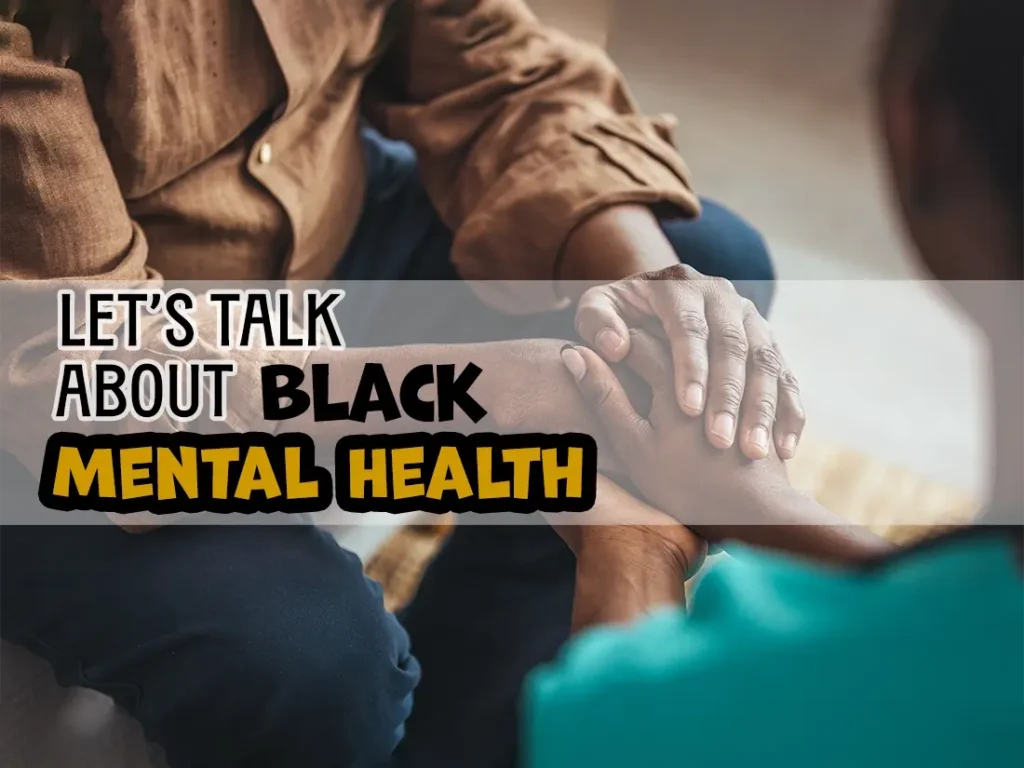For Mental Health Awareness Month, let’s focus on improving Black mental health. As the largest Black owned bank in the country, our hope in highlighting this topic is to further break the stigma and provide actionable steps to put better Black mental health into practice.
For relevant terminology and an overview of how mental health can lead to better financial wellness, consult our B.E.S.T. Approach that works for holiday spending and everyday spending throughout the year!
Access
Unequal access to health care, including lack of insurance coverage is a major contributor to the current state of Black mental health. It is a formidable enemy in addressing disparate mental health outcomes. In 2020, the percentage of Black adults 18 and over who received mental health services for any mental illness was 60% of the percentage for white adults. There is no single form that inaccessibility takes, rather it persists as systemic barriers throughout the Black community.
Historical Mistrust
America’s history of unethical medical practices, such as the Tuskegee Experiment (1932-1972), has contributed to a lack of trust within the Black community towards medical professionals. Rebuilding community trust is necessary to create healthier medical outcomes.
Community Stigma
The Black community has historically suppressed mental health conversations even within family. Increasingly we are breaking through the negative stigmas of depression and other mental health issues. We hope to normalize conversations around our mental well-being.
Geographic Exclusion
The Black community is more likely to suffer from geographic inaccessibility with limited or no nearby mental healthcare providers. Mental health resource deserts mean we must travel further than our white counterparts to just begin the conversation on sourcing care.
Addressing these factors, lack of healthcare access including insurance coverage, historical mistrust, community stigma and geographic exclusion, can help us on the journey to better mental well-being. However, they are no replacement for appropriate treatment.
Biased Professional Field
The Black health experience is rarely included in medical studies, leading to a lack of investigation and literature to understand Black trauma and health outcomes. For instance, Black Americans and Latinos make up 30% of the U.S. population but account for just 6% of all participants in federally funded clinical trials.
Unconscious bias, a lack of diverse clinical trials, and false stereotypes compound to inaccurately inform medical practices.
Limited Cultural Competencies
Professional cross-cultural interactions require experience in diverse languages, communication styles, and emotional intelligence.
Black patients have been found to receive poorer interpersonal communication, from medical professionals including lower levels of rapport-building, less patient-centeredness, and shorter visits, compared with white patients.
Discrimination and dehumanization in healthcare settings can lead to ineffective delivery of health services, with inaccurate diagnosis and treatment of mental health conditions.
Lack of Representation
Data from the American Psychiatric Association (APA) shows that only 2 percent of psychiatrists in the U.S. are Black, and just 4 percent of psychologists are Black. Those are staggering low percentages that leaves the Black community with few options even when we can access care.
Studies show that the Black community experiences mental health conditions at similar rates to our white counterparts. However, within our community, Black men experience a suicide rate four times greater than Black women.
Black men can be particularly concerned about the stigma and perceived signs of “weakness” around sharing mental health concerns.
Online Resources
Fortunately, today there are online resources, such as:
Therapy for Black Men: Provides a directory for Black men looking for care with a judgment-free, multiculturally competent selection of therapists and coaches.
Therapy for Black Girls: An empowering online resource provides an online space where you can source a therapist in your local area or choose online sessions.
Black Mental Wellness: Provides a host of educational resources, training opportunities, and fact sheets about mental health disorders like anxiety and bipolar disorder, amongst others.
Here are some action items to build greater access to mental health resources in the Black community and help rebuild trust between the Black community and medical professionals.
- Encourage each other to seek out mental health resources and therapy and share resources and your own experiences.
- Continue to build community-based resources, such as support groups and counseling services.
- Advocate for increased funding for community-based mental health resources for the Black community.
- Encourage young Black medical talent to join the profession and appeal to institutions to build greater opportunities for aspiring Black psychiatrists and counselors.
- Educate medical professionals on the history of racism and discrimination within medical systems and provide training on culturally competent care.
- Support and participate in advocacy efforts aimed at addressing disparities in mental health outcomes for the Black community.
With more clarity on the lack of mental health resources in the Black community, we can break down barriers. With actionable steps, we can challenge the gates of health inequity and say… OPEN UP!
Our next glow-up looks like a consistent physical and mental well-being routine. Check-in with yourself and your loved ones. Every conversation brings us closer together and increases empathy.
Our closest ties are a major influence in the decision to seek treatment and make us feel understood and empowered. Let’s empower each other on our mental health journeys! #BlackMentalHealth


















